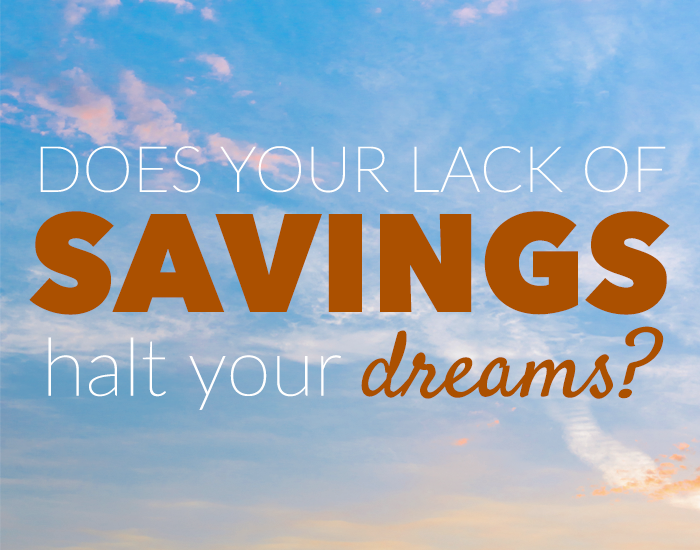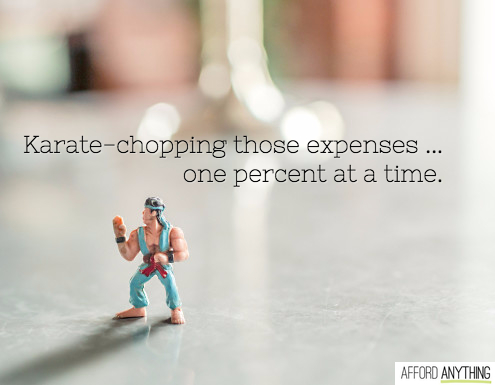
Several weeks ago, I invited new email subscribers to share their answers to two deeply personal questions:
What’s your wildest dream, and what’s preventing you from getting there?
The answers poured in to a degree I couldn’t believe. My Inbox flooded with hopes and sorrows. Some people shared brief-but-honest answers; others wrote memoirs. People from all walks of life and all corners of the globe responded. While each person’s dreams and obstacles are unique, a few common threads emerged.
One of those common obstacles stemmed from an inability to save. The stories sound like this (paraphrased; no identifying info):
- “I’m in my 50’s and I’m woefully unprepared for retirement. How can I catch-up now that time is running short? My 60’s are close, and it scares me.”
- “I’m 25 and I’m overwhelmed by how expensive adulthood is. Between paying off my student loans, planning a wedding and hopefully buying a house, I don’t know how I can pay for it all. I want to travel, too, while I’m still young, and I’d like to start investing, but I don’t know how I can cover all of that. I make $40,000.”
- “I’m taking care of my elderly parents and two children. I’d like to earn more, but its hard to boost my income when I have so many family responsibilities. I’m in debt, and I need to save more money so I can be prepared for my own retirement.”
The answer to these questions, like the answer to all personal finance questions, can be boiled down to three words: Grow the gap. There’s a chasm between “what you earn” and “what you spend;” make this as wide as possible.
At the risk of sounding like Captain Obvious, the only two ways to widen this chasm are by earning more (side hustles; real estate; investments) and spending less; today we’ll focus on the latter option.
The easiest way to spend less is by adopting an anti-budget: Yank your savings off the top, go wild with the rest. As long as you’re saving 25% or 45% or 75% of your income — (whatever number you choose) — you can spend the rest guilt-free.

When you’re handling “the rest,” that spending money, you’ll obviously first pay your bills; you can spend whatever’s leftover on sheer ridiculousness to your heart’s delight. Order a 2nd martini and relish that $100 filet mignon. You’ve yanked your savings from the top first; the rest is YOLO money.
“Sounds awesome. How much should I save?”
Twenty percent is the bare minimum — that’s enough to pad your retirement accounts (10-15%) and emergency fund (5-10%), but not much else. (I’m assuming you’re debt-free, except the mortgage.) I’d consider a 20% saver to be a Financial Awesomeness Novice, which is fine, since we have to start somewhere. (That’s where I started, during my first 9-to-5 job.)
(Wow, I put a lot of parentheses into that last paragraph.)
(Okay, now I’m just out of control. Whoa!! (!!))
Fifty percent or more is ideal. To rephrase that: Save half. That simple two-word directive is the road towards dazzling yourself with how carefree and easy your life has turned out.
Remember when you were a little kid, and the grown-ups cautioned you that adulthood is stressful? Hogwash. Total baloney. Being a grown-up rocks. The world is your playground. Everyday is a field trip. And all of it — all of it — is brought to you by saving half and investing that moolah into passive-income-assets like index funds or rental properties.
Most of you have accomplished much harder tasks. You’ve learned calculus and chemistry. You mastered a foreign language or a musical instrument. You read Dostoevsky. Heck, you learned how to spell “Dostoevsky.” Or, for that matter, how to spell “Mississippi” and “hippopotamus.”
The road to financial independence is far simpler. You invest in index funds and/or a handful of properties, lather/rinse/repeat, and voila, life is awesome. It’s easier than studying mitochondria.
“Okay, you make a convincing (rose-tinted, but convincing) case. How do I save half?”
If you’re single, the sole breadwinner, or a couple with separate finances, automatically direct-deposit half of your paycheck(s) into a savings account. From there, transfer it into investments, your emergency fund, or debt payoff.
If you’re a dual-income couple with joint finances, ask yourself: Who earns more? Whomever that person is, automatically shoot their entire paycheck into savings. Live solely on the other person’s income. By definition, this guarantees you’ll save more than 50%.
This also sets you into a sustainable mindset: You’ll buy houses, cars and enter other obligations with the mental framework that you’re living on one income. If you later decide to drop down to a one-income household, you’re ready.
(Many of my friends are buying their first homes. When they ask for my advice, I urge them to assume they’ll become a one-income couple in the future, and pick a home based on that budget. It’s fantastic if both partners choose to keep working, but why not give yourself the option to quit? Plus, if one person loses their job, you’ll feel cool as a cucumber.)
“Great tactics. But you’re jumping the gun, Paula.
“I’m not asking how to divert money; I’m asking how to find it. I live frugally. I’d love to save more, but I have no flippin’ idea where else I can cut back.”
Enter: the One Percent Challenge.
The premise is simple: You create savings one percent at a time. If you currently save 10 percent of your income, save 11 percent this month. If you currently save 25 percent, save 26 percent this month. Next month, notch up by one more percent. The following month, repeat. You’ll be saving an extra 12 percent, above-and-beyond your current rate, within a year.
(To calculate one percent, lop two zeros from your monthly pay. If you earn $4,000 per month, one percent is $40. If you earn $8,000 per month, it’s $80.)
A whole bunch of Afford Anything Rebels started this challenge in January. (If you didn’t, or if you’re new here, join us! No day but today!) We’ve started a Facebook group*, and I’m awed by the innovative ideas that the Rebels are sharing. Let’s take a peek:
- Use Google Voice or Skype instead of Verizon, T-Mobile or any other major cell phone company.
- Pay car insurance annually or biannually instead of monthly. One reader is saving $100/year through this move alone.
- Calculate how much less you’re spending on gasoline, now that fuel is cheaper. Move this to a savings/investment account.
- List one item on Craigslist or eBay per week.
- Use Billcutterz to negotiate lower bills on your behalf. If they succeed, you each keep half. (Not an affiliate link; I never affiliate to something unless I use it myself).
- Use Acorns to “round up” the change from every purchase. Invest this money automatically. (Affiliate link; I use this service and recommend it.)
- Use Qapital, a paid service that scans your spending habits and automatically tucks away tiny amounts of money into “invisible” savings. Out of sight, out of mind. (Affiliate link – you get a bonus $25 if you use it or use the code ‘paula,’ and it’s a service I love!)
- Save every $5 bill that comes your way (you could also do this with $1 or $10 bills). Put it into a jar or envelope, and deposit when it’s full.
- Find a location-independent freelance gig and save 100% of that income. (This is how I paid for two years of world travel, back when my full-time salary ranged from $21,000 – $31,000).
Here are some of the ways I saved in 2015, when this post was originally published:
- Switched to a different health insurance with a lower monthly premium. The savings goes to the HSA account.
- Switched to a different natural gas plan.
- Started using Qapital to automatically transfer small amounts (that I don’t notice or miss) into savings.
- Became far more organized with bookkeeping by outsourcing it, which should help me optimize legitimate write-offs during tax season.

Join the Facebook group*, take the One Percent Pledge, and share how you’re trimming your budget — one percent at a time.
* As of 2018, we rebranded the Facebook group as the Afford Anything Community. In addition to sharing ways to save, we also talk about financial freedom, business, and real estate!
